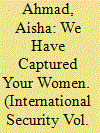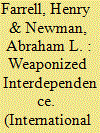|
|
|
Sort Order |
|
|
|
Items / Page
|
|
|
|
|
|
|
| Srl | Item |
| 1 |
ID:
167615


|
|
|
|
|
| Summary/Abstract |
Since 1990, China has used coercion in its maritime territorial disputes in the South China Sea, despite adverse implications for its image. China is curiously selective in its timing, targets, and tools of coercion: China rarely employs military coercion, and it does not coerce all countries that pose similar threats. An examination of newly available primary documents and hundreds of hours of interviews with Chinese officials to trace the decisionmaking processes behind China's use and nonuse of coercion reveals a new theory of when, why, and how China employs coercion against other states, especially in the South China Sea. Contrary to conventional wisdom, the findings show that China is a cautious bully that does not use coercion frequently. In addition, when China becomes stronger, it tends to use military coercion less often, choosing instead nonmilitary tools. Moreover, concerns with its reputation for resolve and with economic cost are critical elements of Chinese decisionmaking regarding the costs and benefits of coercing its neighbors. China often coerces one target to deter others—“killing the chicken to scare the monkey.” These findings have important implications for how scholars understand states' coercive strategies and the future of Chinese behavior in the region and beyond.
|
|
|
|
|
|
|
|
|
|
|
|
|
|
|
|
| 2 |
ID:
167616


|
|
|
|
|
| Summary/Abstract |
Permanent world peace is beginning to emerge. States with developed market-oriented economies have foremost interests in the principle of self-determination of all states as the foundation for a robust global marketplace. War among these states, even making preparations for war, is not possible, because they are in a natural alliance to preserve and protect the global order. Among other states, weaker powers, fearing those that are stronger, tend to bandwagon with the relatively benign market-oriented powers. The result is a powerful liberal global hierarchy that is unwittingly, but systematically, buttressing states' embrace of market norms and values, moving the world toward perpetual peace. Analysis of voting preferences of members of the United Nations General Assembly from 1946 to 2010 corroborates the influence of the liberal global hierarchy: states with weak internal markets tend to disagree with the foreign policy preferences of the largest market power (i.e., the United States), but more so if they have stronger rather than weaker military and economic capabilities. Market-oriented states, in contrast, align with the market leader regardless of their capabilities. Barring some dark force that brings about the collapse of the global economy (such as climate change), the world is now in the endgame of a five-century-long trajectory toward permanent peace and prosperity.
|
|
|
|
|
|
|
|
|
|
|
|
|
|
|
|
| 3 |
ID:
167612


|
|
|
|
|
| Summary/Abstract |
Newly available sources show how the 1993–95 debate over the best means of expanding the North Atlantic Treaty Organization unfolded inside the Clinton administration. This evidence comes from documents recently declassified by the Clinton Presidential Library, the Defense Department, and the State Department because of appeals by the author. As President Bill Clinton repeatedly remarked, the two key questions about enlargement were when and how. The sources make apparent that, during a critical decisionmaking period twenty-five years ago, supporters of a relatively swift conferral of full membership to a narrow range of countries outmaneuvered proponents of a slower, phased conferral of limited membership to a wide range of states. Pleas from Central and Eastern European leaders, missteps by Russian President Boris Yeltsin, and victory by the pro-expansion Republican Party in the 1994 U.S. congressional election all helped advocates of full-membership enlargement to win. The documents also reveal the surprising impact of Ukrainian politics on this debate and the complex roles played by both Strobe Talbott, a U.S. ambassador and later deputy secretary of state, and Andrei Kozyrev, the Russian foreign minister. Finally, the sources suggest ways in which the debate's outcome remains significant for transatlantic and U.S.-Russian relations today.
|
|
|
|
|
|
|
|
|
|
|
|
|
|
|
|
| 4 |
ID:
167614


|
|
|
|
|
| Summary/Abstract |
In recent years, jihadists across the world have transformed their gendered violence, shocking the world by breaking from prior taboos and even celebrating abuses that they had previously prohibited. This behavior is surprising because jihadists represent a class of insurgents that are deeply bound by rules and norms. For jihadists, deviating from established Islamist doctrines is no easy feat. What then explains these sudden transformations in the rules and norms governing jihadist violence? An inductive investigation of contemporary jihadist violence in Pakistan and Nigeria reveals a new theory of jihadist normative evolution. Data from these cases show that dramatic changes in jihadist violence occur when an external trigger creates an expanded political space for jihadist entrepreneurs to do away with normative constraints on socially prohibited types of violence. As these jihadist leaders capitalize on the triggers, they are able to encourage a re-socialization process within their ranks, resulting in the erosion of previously held taboos, the adoption of proscribed behaviors, and the emergence of toxic new norms.
|
|
|
|
|
|
|
|
|
|
|
|
|
|
|
|
| 5 |
ID:
167613


|
|
|
|
|
| Summary/Abstract |
Liberals claim that globalization has led to fragmentation and decentralized networks of power relations. This does not explain how states increasingly “weaponize interdependence” by leveraging global networks of informational and financial exchange for strategic advantage. The theoretical literature on network topography shows how standard models predict that many networks grow asymmetrically so that some nodes are far more connected than others. This model nicely describes several key global economic networks, centering on the United States and a few other states. Highly asymmetric networks allow states with (1) effective jurisdiction over the central economic nodes and (2) appropriate domestic institutions and norms to weaponize these structural advantages for coercive ends. In particular, two mechanisms can be identified. First, states can employ the “panopticon effect” to gather strategically valuable information. Second, they can employ the “chokepoint effect” to deny network access to adversaries. Tests of the plausibility of these arguments across two extended case studies that provide variation both in the extent of U.S. jurisdiction and in the presence of domestic institutions—the SWIFT financial messaging system and the internet—confirm the framework's expectations. A better understanding of the policy implications of the use and potential overuse of these tools, as well as the response strategies of targeted states, will recast scholarly debates on the relationship between economic globalization and state coercion.
|
|
|
|
|
|
|
|
|
|
|
|
|
|
|
|
|
|
|
|
|